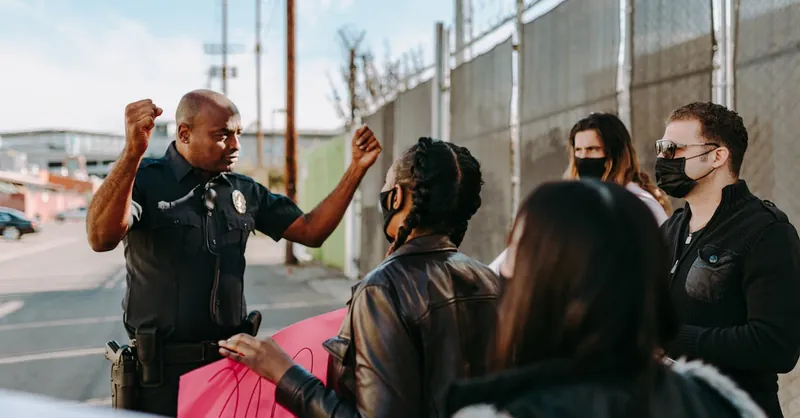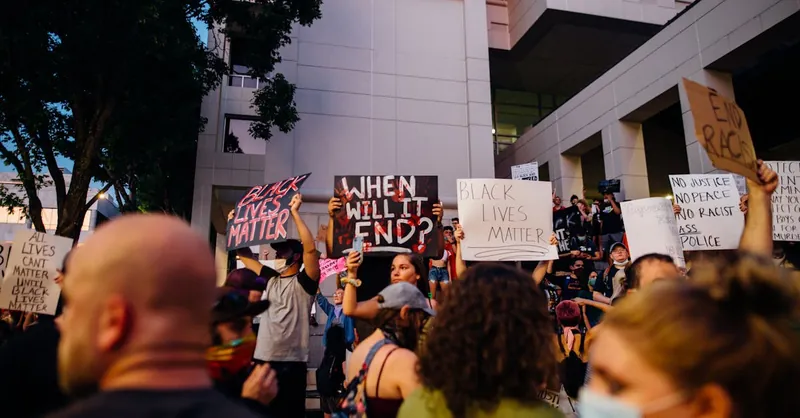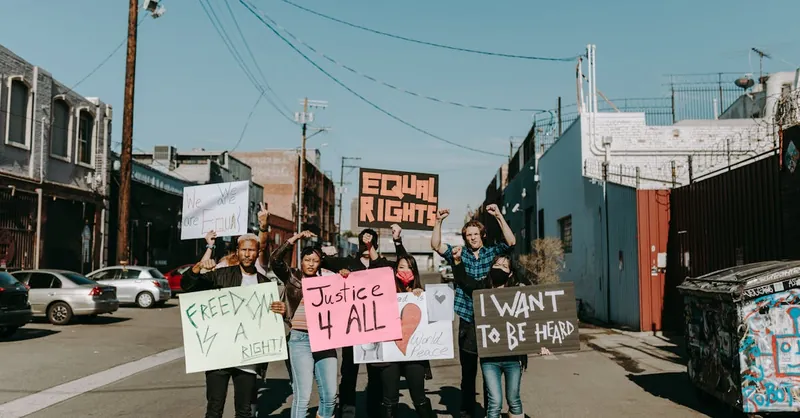How Karens Create Unfairness: Unpacking Entitlement & Injustice
Category: Social Issues
Understanding the Unfairness Stirred by Karens
You’ve probably encountered situations where one person’s over-the-top demands derail fairness for others — often in public spaces, workplaces, or community settings. If you're here, you’re likely someone who cares deeply about social justice, fairness, and the dynamics that perpetuate inequality. Perhaps you’ve been frustrated seeing how certain entitled behaviors monopolize attention and resources, and you want to understand the mechanisms behind them. This post dives beyond surface-level rants and viral videos to critically analyze how 'Karens' — a cultural shorthand for entitled, often white middle-class individuals aggressively demanding preferential treatment — create broader social unfairness.
Instead of just calling out poor behavior, I’ll unpack how such entitlement disrupts equity across social and institutional levels, fueling injustice and resentment. I’ll examine the psychological, cultural, and systemic factors enabling these patterns, backed by research and case examples. Whether you’re an activist, educator, or socially conscious reader eager to better analyze and counteract these dynamics, this article offers a comprehensive, nuanced perspective that goes beyond meme culture to help you grasp the root causes of Karen-driven unfairness — equipping you with insights you won’t find in typical commentary.
- Understanding the Unfairness Stirred by Karens
- Defining the 'Karen' Phenomenon: Origins, Characteristics, and Why It Matters
- The Psychology of Entitlement: What Drives Karen Behavior?
- Public Spaces Under Siege: How Karens Disrupt Social Equity in Everyday Settings
- Institutional Unfairness: When Karens Influence Policies and Workplace Dynamics
- Racial and Social Justice Implications: Intersectionality and Karen Complaints
- The Role of Social Media: Amplifying Entitlement and Its Impact on Public Perception
- Economic Consequences: How Karen Behavior Costs Businesses and Communities
- Deconstructing Karen Complaints: When Perceived Rights Clash with Others' Freedoms
- Strategies for Addressing and Mitigating Karen-Driven Unfairness
- The Broader Cultural Context: What Karen Behavior Reveals About Social Power Structures
Defining the 'Karen' Phenomenon: Origins, Characteristics, and Why It Matters
The term "Karen" has evolved from internet slang into a widely recognized cultural shorthand describing individuals—predominantly middle-class white women—who exhibit entitled, demanding, and often aggressive behavior that disproportionately disrupts fairness in social contexts. While its exact origin is debated, "Karen" gained popularity through viral social media videos and memes where such figures call authorities or use public spaces to assert unwarranted control or privileges. Importantly, this phenomenon is not merely about rude behavior; it reflects deeper issues of systemic privilege, racial and social dynamics, and unequal power relations.
Core Characteristics of the Karen Archetype
- Entitlement to Special Treatment: Karens often insist on exceptions to rules, expecting immediate compliance from service workers or public officials without regard for established protocols.
- Aggressive Enforcement of Personal Will: Their demands tend to extend beyond reasonable requests, sometimes escalating into threats or calls to law enforcement for minor grievances.
- Lack of Accountability: Rather than acknowledge their impact, Karens frequently portray themselves as victims, deflecting responsibility for the unfair disruption they cause.
- Cultural and Racial Privilege: The Karen stereotype is intertwined with white privilege, where social status emboldens individuals to act without fear of consequences in ways others cannot.
Why Understanding the Karen Phenomenon Matters
Grasping the origins and traits of Karen behavior is essential to addressing the wider social injustices it triggers. These actions do not occur in a vacuum; they exploit existing power imbalances, unfairly burden marginalized groups, and strengthen oppressive systems. Recognizing Karen-driven entitlement allows society to:
- Spot patterns that undermine social equity and collective respect.
- Develop strategies to hold entitled behavior accountable without dismissing systemic factors.
- Foster empathy and awareness, encouraging more equitable public interaction.
By defining what the Karen phenomenon really entails, we double down on exposing the unfairness that goes beyond individual incidents—highlighting how this collective behavior perpetuates injustice in everyday life.

Image courtesy of Anna Giorgia Zambrelli
The Psychology of Entitlement: What Drives Karen Behavior?
To truly understand how Karens disrupt fairness and fuel social injustice, it’s crucial to examine the psychological underpinnings of entitlement that drive their behavior. At its core, Karen entitlement stems from a complex mix of cognitive biases, social conditioning, and personality traits that compel them to assert control and demand preferential treatment—even when such demands are unjustified.
Key Psychological Drivers Behind Karen Behavior
- Egocentrism and Narcissism: Karens often exhibit a heightened sense of self-importance, perceiving their needs and rights as paramount over others. This egocentrism leads to a disregard for communal norms or the impacts of their actions on others.
- Illusion of Control: Many Karens struggle with uncertainty or feelings of powerlessness in broader life contexts, so they compensate by aggressively asserting control in everyday interactions, particularly in service or institutional roles.
- Cognitive Dissonance and Rationalization: When confronted with the consequences of their behavior or social pushback, Karens frequently employ denial or victim narratives to maintain a positive self-image, avoiding accountability for unfair actions.
- Social and Cultural Reinforcement: Entitlement behavior is often normalized or even rewarded within certain social circles, where privilege goes unchecked. This reinforcement strengthens the belief that demanding special treatment is both acceptable and expected.
The Role of Societal Privilege in Shaping Entitlement
Entitlement does not arise in isolation—it is amplified by systemic privilege, especially racial and socioeconomic advantages. Karens typically benefit from social structures that implicitly support their status, granting them a psychological safety net to behave with impunity. This sense of immunity fuels their confidence to challenge rules and demand exceptions without fear of significant repercussions, unlike marginalized groups who routinely face stricter enforcement.
Understanding these psychological and social dynamics is pivotal for effectively confronting Karen behavior. It reveals that their entitlement is not merely poor manners or isolated rudeness—rather, it is a manifestation of deeper insecurities and systemic inequalities. Addressing these root causes is necessary for reducing the unfairness Karens propagate and for promoting a more equitable and respectful public sphere.

Image courtesy of Mikhail Nilov
Public Spaces Under Siege: How Karens Disrupt Social Equity in Everyday Settings
Public spaces—parks, stores, public transit, restaurants, and community centers—are meant to be shared environments where fairness and respect govern interactions. However, when Karens enter these spaces, their entitled behavior often acts as a corrosive force, disrupting the social equity that allows diverse communities to coexist peacefully. By demanding special privileges, ignoring rules, or aggressively policing others’ behavior, Karens impose unfair burdens on both individuals and institutions tasked with serving the public.
The Impact of Karen Behavior in Public Spaces
-
Monopolizing Resources and Attention: Karens frequently insist on bypassing standard lines, reservations, or wait times, forcing service staff to prioritize their demands at the expense of others who comply with the rules. This not only delays service for everyone else but also undermines fairness by creating a hierarchy of customer importance based solely on entitlement.
-
Weaponizing Authority to Exclude and Silence: By calling law enforcement or management over minor or imagined infractions—often with racial or class biases embedded—Karens weaponize institutional power to intimidate marginalized groups. This practice fosters an environment of fear and exclusion, where people of color or lower socioeconomic status are unfairly targeted or displaced from public spaces meant to be inclusive.
-
Eroding Trust in Public Institutions: When employees and officials feel pressured to prioritize Karen demands, it skews their impartial enforcement of rules and policies. Over time, this damages the legitimacy of institutions charged with maintaining equitable access and safety, fueling resentment among community members who witness these unjust privileges.
Why This Matters for Social Equity
Public spaces are microcosms of societal fairness; when entitlements upset these delicate balances, they exacerbate divides rooted in race, class, and power. Karen-driven disruptions reveal how intersectional privilege allows certain individuals to override collective norms, undermining equity and social cohesion. Countering this requires raising awareness of how entitlement manifests in daily interactions and pushing for policies that protect equitable treatment regardless of social status or identity.
Recognizing the ways Karens disrupt social equity in public spaces is a critical step in reclaiming fairness and fostering truly inclusive communities.

Image courtesy of RDNE Stock project
Institutional Unfairness: When Karens Influence Policies and Workplace Dynamics
Karen behavior extends far beyond individual interactions, infiltrating institutional settings where it shapes policies and workplace cultures in profoundly unfair ways. When entitled individuals leverage their social privilege in organizational environments—whether schools, offices, or service industries—they not only demand special treatment but also influence decision-making processes that disadvantage others. This phenomenon contributes to systemic inequities, as the “Karen effect” skews policy enforcement, amplifies bias, and undermines inclusive workplace dynamics.
How Karen Influence Distorts Institutional Fairness
-
Policy Manipulation and Exception-Making: Karens often pressure institutions to bend or reinterpret rules to suit their personal preferences. Whether it’s securing unwarranted accommodations, exemptions, or bypassing protocols, their demands can prompt administrators and managers to create exceptions that erode the consistency and fairness of organizational policies.
-
Creating a Toxic Workplace Environment: The aggressive, entitled behavior typical of Karens can foster fear, stress, and resentment among employees, especially frontline workers who are targeted or pressured to comply. This dynamic often stifles open communication and disproportionately affects marginalized coworkers who may lack the same institutional protections.
-
Leveraging Complaints to Intimidate and Control: By escalating minor grievances into formal complaints or threats, Karens weaponize institutional grievance procedures to exert undue influence. This tactic can lead to punitive actions against employees or coworkers who refuse to accommodate unreasonable demands, resulting in an uneven playing field that favors entitlement over fairness.
-
Reinforcing Institutional Bias and Inequity: The preferential treatment Karens receive is often entwined with racial and socioeconomic privilege, reinforcing systemic patterns of discrimination. Institutional leaders who acquiesce to Karen demands may unintentionally prioritize the voices of the entitled, sidelining the needs and rights of underrepresented groups within the organization.
Why Addressing Karen Influence in Institutions Matters
Recognizing the ways Karens impact policies and workplace dynamics is critical to promoting institutional equity. Without checks on entitlement-driven pressures, organizations risk normalizing unfair practices that disadvantage employees and stakeholders who adhere to rules fairly. Effective strategies include:
- Establishing clear, consistent policies with transparent enforcement mechanisms.
- Training leadership and staff to recognize entitlement behaviors and address them promptly.
- Creating safe channels for employees to report coercion or unfair treatment without retaliation.
- Fostering organizational cultures grounded in respect, accountability, and equity rather than appeasement of privileged demands.
Combating the institutional unfairness catalyzed by Karens requires systemic awareness and deliberate action to ensure that rules serve all members equally, rather than reinforcing the power of the entitled few. Doing so not only protects vulnerable employees but also strengthens the integrity and fairness of organizations as a whole.

Image courtesy of Yan Krukau
Racial and Social Justice Implications: Intersectionality and Karen Complaints
The Karen phenomenon cannot be fully understood without considering its racial and social justice implications, particularly through the lens of intersectionality. Karens often weaponize their social position—rooted in white privilege, middle-class status, and gender dynamics—to escalate minor conflicts into serious complaints, disproportionately affecting marginalized communities. These complaints do more than inconvenience individuals; they reinforce systemic inequalities by perpetuating racial profiling, social exclusion, and institutional bias.
How Karen Complaints Unequally Impact Marginalized Groups
-
Racial Profiling and Disproportionate Policing: Many viral Karen incidents involve calls to law enforcement against people of color for routine, everyday behaviors—such as sitting in public spaces, shopping, or caregiving—that Karens perceive as suspicious or inappropriate. These false complaints feed into a larger pattern of racial profiling, effectively weaponizing police power to police Black, Indigenous, and people of color (BIPOC) in public spheres unfairly.
-
Amplification of Social Inequities: Because Karens often come from socially and economically privileged backgrounds, their complaints carry outsized weight in institutional responses. This amplifies existing social hierarchies, marginalizing lower-income individuals or those with less social capital by subjecting them to harsher scrutiny, exclusion, or punitive actions.
-
Intersectional Harm: The Karen’s actions disproportionately impact individuals at the intersection of race, class, and gender oppression. For example, Black women and LGBTQ+ people often face heightened vulnerability to unjust complaints due to compounded stereotypes and discrimination, revealing how intersectionality intensifies the harms borne by those targeted by entitlement-driven policing.
The Broader Social Justice Stakes
The persistence of Karen complaints highlights how individual entitlement acts as a microcosm of systemic injustice. These incidents are not isolated but part of a larger framework where power, race, and social status intersect to sustain inequality. Addressing the Karen dynamic is therefore critical to dismantling patterns of racialized displacement and social exclusion in:
- Public institutions (schools, transit, housing)
- Workplace environments
- Community safety policies
To promote racial and social justice, it is essential to recognize that entitlement-driven complaints by Karens do not merely inconvenience individuals, but propagate structural inequities that undermine fairness and inclusion. Strategies must include both raising awareness about intersectional harms and advocating for reforms that limit misuse of authority rooted in social privilege. By situating Karen behavior within these justice frameworks, activists and policymakers can better tackle the complex ways entitlement sustains racial and social injustice today.

Image courtesy of Kelly
The Role of Social Media: Amplifying Entitlement and Its Impact on Public Perception
Social media platforms act as powerful amplifiers for Karen behavior, transforming isolated incidents into viral spectacles that magnify their sense of entitlement and fuel widespread public discourse. By capturing and broadcasting moments where Karens assert dominance or weaponize institutional power, social media not only spreads awareness but also inadvertently elevates their disruptive tactics into performative status symbols. This amplification contributes to a feedback loop that emboldens entitlement, making Karen behavior seem more frequent, normalized, and socially acceptable than it might be otherwise.
How Social Media Amplifies Karen Entitlement
-
Viral Exposure and Validation: Viral videos showcasing Karen outbursts often garner millions of views, likes, and shares, providing these individuals with a perverse form of social validation. This visibility encourages others to mimic similar behavior, believing it will yield attention, support, or leverage in real-world conflicts.
-
Selective Narratives and Simplification: Social media distills complex interactions into short clips or memes that highlight the most shocking or outrageous elements. This simplification can obscure underlying systemic issues, framing the problem as individual "crazy Karen" actions rather than broader social inequities—thereby limiting public understanding and reducing dialogue to entertainment.
-
Polarizing Public Perception: Posts and comments often polarize audiences, generating heated debates that reinforce echo chambers. Some users empathize with the Karen’s perceived grievances, while many condemn the entitlement, deepening societal divides and complicating efforts to address the root causes of unfairness.
-
Rapid Spread of Racialized Incidents: Social media accelerates the dissemination of Karen-related racial profiling cases, increasing public scrutiny but also sometimes fueling misinformation, stereotyping, and backlash. This dual-edged effect shapes collective attitudes about race, privilege, and justice in highly volatile ways.
Impact on Social Justice Movements and Public Awareness
While social media undeniably raises awareness of entitlement-driven injustice, it also risks reducing complex social justice issues to viral content or hashtag activism. However, when harnessed thoughtfully, these platforms can:
- Expose systemic patterns of privilege and abuse tied to Karen behavior.
- Mobilize communities to demand accountability from institutions and individuals.
- Educate broader audiences about the intersectionality of entitlement, race, and power.
Understanding the role of social media in amplifying Karen entitlement is essential for those committed to dismantling unfairness. It offers both opportunities and challenges for shaping public perception and catalyzing meaningful change—provided users and activists resist sensationalism and foster informed, inclusive conversations instead.

Image courtesy of Sergey Platonov
Economic Consequences: How Karen Behavior Costs Businesses and Communities
The ripple effects of Karen entitlement extend well beyond social discomfort and institutional bias—their disruptive actions impose significant economic costs on businesses and communities alike. When entitled individuals demand special treatment, ignore policies, or escalate minor disputes into formal complaints, the financial burden often falls on service providers, employees, and local economies. Understanding these economic consequences highlights why addressing Karen behavior is not only a matter of social justice but also critical for sustaining healthy, equitable business environments and thriving communities.
Financial Impact on Businesses
- Increased Operational Costs: Accommodating unreasonable demands or quickly resolving escalated conflicts drains resources. Businesses may spend extra time managing complaints, divert staff to handle disputes, or even incur higher security costs due to amplified tensions initiated by Karens.
- Employee Turnover and Training Expenses: Frequent exposure to aggressive Karen behavior can lead to burnout, low morale, and higher turnover among frontline employees. Recruiting and training replacements impose additional financial strain on companies striving to maintain quality customer service.
- Loss of Customer Loyalty and Revenue: Other customers witnessing entitlement-driven disruptions may choose to avoid establishments viewed as unsafe or unjust, reducing repeat business and damaging brand reputation. Negative online reviews or viral videos of Karen incidents can further deter potential clientele.
- Legal and Liability Risks: Escalated conflicts sometimes result in lawsuits or regulatory scrutiny, especially when discriminatory complaints arise. Businesses may face costly settlements, fines, or mandated policy changes, compounding economic losses.
Broader Community and Economic Implications
- Diminished Public Trust in Local Institutions: When Karens repeatedly mobilize call-ins or complaints that overwhelm public services, community resources become strained, impacting service delivery for all residents and escalating operational costs for municipalities.
- Erosion of Equitable Economic Access: By leveraging social privilege to demand preferential treatment, Karens inadvertently reinforce barriers for marginalized entrepreneurs and consumers, undermining inclusive economic participation and widening wealth gaps.
- Negative Impact on Community Cohesion and Growth: Persistent entitlement behavior fosters social divisions that discourage communal cooperation and investment, hindering economic development and the creation of vibrant, welcoming neighborhoods.
Why Businesses and Communities Must Act
Tackling the economic fallout from Karen behavior requires proactive strategies—including comprehensive staff training on conflict de-escalation, clear policies for handling entitlement and discriminatory complaints, and community education initiatives emphasizing equity and respect. By mitigating these costs, businesses and communities can promote fairness while safeguarding their financial sustainability and social well-being.
Addressing Karen-driven economic unfairness is therefore a fundamental step toward building resilient institutions and inclusive economies that serve everyone, not just the entitled few.

Image courtesy of Mikhail Nilov
Deconstructing Karen Complaints: When Perceived Rights Clash with Others' Freedoms
At the heart of many Karen-driven incidents lies a fundamental conflict: the perceived entitlement to assert personal rights against the equally valid freedoms of others. These complaints often escalate because Karens view their demands as non-negotiable rights, frequently ignoring or minimizing how such assertions infringe upon others’ autonomy, dignity, or legal protections. This clash between individual perceived rights and collective societal freedoms not only stokes interpersonal tensions but also perpetuates systemic unfairness.
The Illusion of Absolute Rights vs. Shared Social Responsibilities
Karens frequently operate under the misconception that their personal preferences or interpretations of "rights" supersede established rules or others’ boundaries. This illusion of absolute rights manifests in demands such as:
- Unrestricted access or exceptions to policies — disregarding why rules exist to protect everyone’s safety and fairness.
- The insistence on immediate compliance — prioritizing their convenience over communal order and respect.
- The reframing of reasonable regulations as personal infringements — fueling grievances that justify escalated complaints.
However, legal and ethical frameworks emphasize that individual rights exist within a web of shared social responsibilities. Exercising one’s freedoms must not violate the freedoms or rights of others. When Karens fail to acknowledge this balance, their complaints create unjust barriers and social friction, undermining mutual respect and equity.
How Karen Complaints Undermine Others’ Freedoms and Rights
Karens’ aggressive complaint tactics often:
- Suppress the voices and experiences of marginalized individuals, by overshadowing genuine grievances with their amplified personal demands.
- Impose unfair constraints on service workers and public officials, who must navigate unreasonable expectations while maintaining impartiality.
- Enable discriminatory enforcement when institutional actors respond to Karen complaints disproportionately, often to the detriment of BIPOC, disabled, or lower-income groups.
This dynamic transforms what might be a minor disagreement into a power struggle, where entitlement trumps fairness, and private grievances wield outsized influence over collective norms.
Promoting Equitable Interactions: Balancing Rights with Respect
To address the unfairness sparked by Karen complaints, it is essential to cultivate an understanding that rights are neither absolute nor self-serving; they must be exercised with respect for others’ freedoms and communal well-being. This involves:
- Encouraging empathy and situational awareness to see beyond personal perspectives.
- Training institutions and service providers to enforce policies consistently, resisting undue pressure from entitlement-driven complaints.
- Educating the public about the distinction between rights and privileges, emphasizing collective responsibility.
By deconstructing Karen complaints through this lens, we reveal how their perceived rights clash disrupt fairness and social harmony—and why restoring balance is crucial for fostering inclusive, just communities.

Image courtesy of Thirdman
Strategies for Addressing and Mitigating Karen-Driven Unfairness
Confronting the widespread unfairness caused by Karen behavior requires targeted strategies that empower individuals, institutions, and communities to respond effectively and promote equity. Addressing entitlement-driven disruptions is not simply about policing rude behavior; it involves dismantling the systemic enablers of Karen conduct and establishing frameworks that safeguard fairness and respect for all parties. Here are essential approaches that can mitigate Karen-driven injustice while fostering more inclusive social environments:
1. Empowering Bystanders and Frontline Workers
Karens often exploit power imbalances by pressuring frontline staff or bystanders into compliance. Providing training in de-escalation techniques, assertive communication, and boundary-setting empowers these individuals to respond calmly yet firmly to entitlement without capitulating. Equipping employees and witnesses with knowledge about their rights and institutional policies helps:
- Reduce the emotional toll of aggressive encounters.
- Maintain consistent enforcement of rules.
- Prevent Karens from leveraging intimidation or manipulation.
2. Establishing Clear, Enforceable Policies
Organizations and public institutions should develop comprehensive, transparent policies that explicitly outline acceptable behavior, complaint procedures, and consequences for entitlement-driven disruptions. Such policies must be consistently enforced regardless of social status to ensure fairness. Key elements include:
- Zero-tolerance stances against abusive or discriminatory conduct.
- Clear guidelines distinguishing legitimate grievances from entitlement-fueled complaints.
- Mechanisms for protecting marginalized individuals disproportionately targeted by Karen behavior.
3. Promoting Awareness and Cultural Change
Long-term mitigation requires shifting cultural norms that normalize entitlement as acceptable. Awareness campaigns, community dialogues, and education initiatives can illuminate the intersection of privilege, power, and entitlement inherent in Karen behavior. This fosters empathy and collective responsibility by:
- Highlighting how entitlement perpetuates systemic unfairness.
- Encouraging self-reflection and accountability among individuals prone to entitlement.
- Strengthening community bonds through shared commitment to respect and equity.
4. Leveraging Legal and Policy Reforms
At a systemic level, advocacy for legal safeguards and institutional reforms helps curtail the negative impacts of entitlement-driven complaints, especially those weaponizing authority against marginalized groups. Strategies include:
- Implementing anti-racial profiling laws and stronger oversight of law enforcement responses to complaints.
- Reforming grievance procedures to prevent misuse while protecting legitimate voices.
- Supporting policies that reduce social and economic inequalities fueling entitlement dynamics.
By integrating these strategies, individuals and institutions can more effectively combat Karen-driven unfairness, restore balance in public and private interactions, and uphold social justice principles. Proactive, equity-focused responses are essential to breaking the cycle of entitlement that undermines fairness and inclusion across society.

Image courtesy of RDNE Stock project
The Broader Cultural Context: What Karen Behavior Reveals About Social Power Structures
Karen behavior is more than isolated incidents of entitlement; it serves as a revealing lens into deeply entrenched social power structures and systemic inequalities. At its core, the Karen phenomenon exposes how societal hierarchies—particularly those based on race, class, and gender—grant certain individuals disproportionate authority to enforce their will at the expense of others’ rights and dignity. This dynamic underscores how entitlement is not an accident but a product of historical and ongoing power imbalances embedded in culture and institutions.
Karen Entitlement as a Microcosm of Structural Privilege
-
White Supremacy and Racial Domination: The Karen archetype is tightly linked with white privilege, manifesting as the unequal ability to police public spaces and institutional rules. This policing often targets marginalized groups, amplifying racial disparities under the guise of civility or rule enforcement. Karens act as enforcers of racial hierarchy, intentionally or not, reproducing systemic racism through everyday interactions.
-
Middle-Class Socioeconomic Advantage: Karens typically come from socioeconomically secure backgrounds, giving them access to resources and social capital that lend credibility and power to their complaints. This class-based entitlement enables them to disrupt norms and demand exceptions without facing typical consequences, deepening economic and social divides.
-
Gendered Expectations and Social Role: The Karen persona also reflects gendered dimensions of power, where certain social privileges are attached to normative conceptions of womanhood—such as invoking victimhood or exercising emotional authority—that can be weaponized to influence others and institutions unfairly.
How Karen Behavior Reinforces and Perpetuates Inequity
- Normalization of Unequal Power: When entitlement is tolerated or excused because of who a person is, it normalizes unequal access to social and institutional power, reinforcing stereotypes and biases that marginalize vulnerable populations.
- Legitimization of Surveillance and Control: Karen actions often mimic broader societal surveillance paradigms, legitimatizing intrusive monitoring and control over marginalized bodies in public and private spheres.
- Obscuring Systemic Accountability: The focus on individual Karen incidents distracts from addressing how institutional policies and cultural norms enable entitlement, preventing meaningful systemic reform.
Understanding Karen behavior within this broader cultural and structural context reveals that combating entitlement is inseparable from challenging the power imbalances it depends upon. True fairness requires not just confronting individual acts of entitlement but also dismantling the social hierarchies that cultivate and protect such behaviors—thereby advancing a more just and equitable society for all.

Image courtesy of Tima Miroshnichenko
